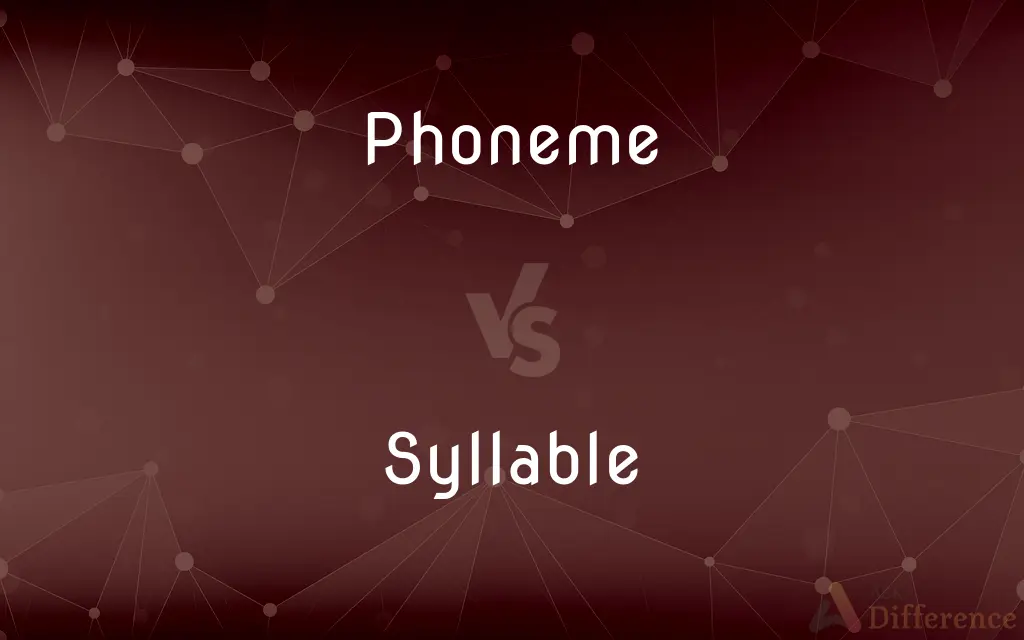Phoneme vs. Syllable — What's the Difference?
By Tayyaba Rehman — Updated on October 11, 2023
Phoneme is the smallest unit of sound that can differentiate words (e.g., /b/ and /p/ in "bat" and "pat"). Syllable is a unit of pronunciation typically containing a vowel and accompanied by consonant(s) (e.g., “cat”).

Difference Between Phoneme and Syllable
Table of Contents
ADVERTISEMENT
Key Differences
Phoneme, in linguistic terms, signifies the smallest unit of sound that may cause a change in meaning within a language. Syllable, on the contrary, is a unit of organization for a sequence of speech sounds and typically consists of a nucleus (most often a vowel) with or without accompanying consonant(s).
The perception of phonemes is intrinsic to recognizing and distinguishing words in any language. Simultaneously, syllables play a pivotal role in organizing a language’s phonology because each word is usually made up of one or more syllables.
There are around 44 phonemes in the English language, including sounds produced by various consonants and vowels. Syllables, however, can be counted by noting vowel sounds, and every word has at least one syllable, serving as a building block for forming words.
Phonemes do not have inherent meaning by themselves, rather they differentiate between meanings of words. Conversely, a syllable may not carry meaning individually (though some do), but collaboratively they construct words and facilitate the rhythmic flow of speech.
In phonetic transcription, phonemes are enclosed within forward slashes, such as /p/ or /b/. In contrast, syllables do not have a universal symbol for representation but can be identified by counting the vowel sounds within words.
ADVERTISEMENT
Comparison Chart
Basic Definition
Smallest sound unit changing word meaning
Unit of pronunciation with one vowel sound
Linguistic Function
Differentiates word meanings
Forms the rhythmic basis of words
Count in English
Approximately 44
Varies per word
Meaning
Does not have standalone meaning
May not have standalone meaning
Example
/p/ vs. /b/ in 'pat' and 'bat'
'Wa-ter' has two syllables
Compare with Definitions
Phoneme
Phoneme is the smallest unit of sound affecting meaning.
The /p/ phoneme in “pin” distinguishes it from “bin.”
Syllable
Consonants within syllables can be onset or coda.
In the syllable plant, pl is the onset and nt is the coda.
Phoneme
Phonemes do not convey meaning individually.
The phoneme /k/ does not mean anything by itself.
Syllable
Syllables create rhythm and flow in language.
The word beautiful has three syllables, creating a unique rhythm.
Phoneme
Phonemes are represented within slashes in transcriptions.
The word “shop” contains the phonemes /ʃ/, /ɒ/, and /p/.
Syllable
Every word has at least one syllable.
The word go is a single syllable.
Phoneme
Phonemes can be consonantal or vocalic sounds.
/ɛ/ is a phoneme found in the word bed.
Syllable
Syllables may or may not carry individual meanings.
The two syllables in booklet don’t convey meaning separately.
Phoneme
Phonemic distinctions can create different words.
Changing the /iː/ phoneme in seat to /ɪ/ gives us sit.
Syllable
A syllable is a unit of organization for a sequence of speech sounds. It is typically made up of a syllable nucleus (most often a vowel) with optional initial and final margins (typically, consonants).
Phoneme
In phonology and linguistics, a phoneme is a unit of sound that can distinguish one word from another in a particular language. For example, in most dialects of English, with the notable exception of the West Midlands and the north-west of England, the sound patterns (sin) and (sing) are two separate words that are distinguished by the substitution of one phoneme, /n/, for another phoneme, /ŋ/.
Syllable
A syllable is a unit of pronunciation with a vowel sound.
Ha-ppy divides into two syllables.
Phoneme
Any of the perceptually distinct units of sound in a specified language that distinguish one word from another, for example p, b, d, and t in the English words pad, pat, bad, and bat.
Syllable
A unit of pronunciation having one vowel sound, with or without surrounding consonants, forming the whole or a part of a word; for example, there are two syllables in water and three in inferno.
Phoneme
The smallest phonetic unit in a language that is capable of conveying a distinction in meaning, as the m of mat and the b of bat in English.
Syllable
Pronounce (a word or phrase) clearly, syllable by syllable.
Phoneme
An indivisible unit of sound in a given language. A phoneme is an abstraction of the physical speech sounds (phones) and may encompass several different phones.
Syllable
A unit of spoken language consisting of a single uninterrupted sound formed by a vowel, diphthong, or syllabic consonant alone, or by any of these sounds preceded, followed, or surrounded by one or more consonants.
Phoneme
(linguistics) one of a small set of speech sounds that are distinguished by the speakers of a particular language
Syllable
One or more letters or phonetic symbols written or printed to approximate a spoken syllable.
Syllable
The slightest bit of spoken or written expression
Do not alter a syllable of this message.
Syllable
To pronounce in syllables.
Syllable
(linguistics) A unit of human speech that is interpreted by the listener as a single sound, although syllables usually consist of one or more vowel sounds, either alone or combined with the sound of one or more consonants; a word consists of one or more syllables.
Syllable
The written representation of a given pronounced syllable.
Syllable
A small part of a sentence or discourse; anything concise or short; a particle.
Syllable
To utter in syllables.
Syllable
An elementary sound, or a combination of elementary sounds, uttered together, or with a single effort or impulse of the voice, and constituting a word or a part of a word. In other terms, it is a vowel or a diphtong, either by itself or flanked by one or more consonants, the whole produced by a single impulse or utterance. One of the liquids, l, m, n, may fill the place of a vowel in a syllable. Adjoining syllables in a word or phrase need not to be marked off by a pause, but only by such an abatement and renewal, or reënforcement, of the stress as to give the feeling of separate impulses. See Guide to Pronunciation, 275.
Syllable
In writing and printing, a part of a word, separated from the rest, and capable of being pronounced by a single impulse of the voice. It may or may not correspond to a syllable in the spoken language.
Withouten vice [i. e. mistake] of syllable or letter.
Syllable
A small part of a sentence or discourse; anything concise or short; a particle.
Before any syllable of the law of God was written.
Who dare speakOne syllable against him?
Syllable
To pronounce the syllables of; to utter; to articulate.
Syllable
A unit of spoken language larger than a phoneme;
The word `pocket' has two syllables
Common Curiosities
How many phonemes are in English?
English consists of approximately 44 phonemes.
Can syllables have more than one vowel?
Generally, syllables contain one vowel sound, which may be represented by single or multiple vowel letters.
What is an example of a phoneme?
The /s/ in "see" and /z/ in "zee" are examples of phonemes.
Can a phoneme carry meaning?
No, a phoneme itself does not carry meaning but distinguishes word meanings.
How does the concept of phonemes aid in linguistics?
Phonemes help linguists understand sound changes and word variations in languages.
What is a phoneme?
A phoneme is the smallest unit of sound that can change word meaning.
How many syllables are in the word “beautiful”?
“Beautiful” has three syllables: beau-ti-ful.
How does a change in phoneme affect word meaning?
A change in phoneme can create a different word, e.g., "cat" to "bat."
Can phonemes influence dialect differences?
Yes, variations in phoneme pronunciation can characterize different dialects.
Can a word be a syllable?
Yes, words can have one syllable (e.g., “cat”) or multiple syllables (e.g., “elephant”).
What is a syllable?
A syllable is a speech unit consisting of one vowel sound, with or without surrounding consonants.
How to identify syllables in a word?
Count the vowel sounds to determine the number of syllables.
Do all languages have the same phonemes?
No, different languages have unique sets of phonemes.
Why are syllables important in poetry?
Syllables create rhythm and meter, essential elements in poetry.
Can syllables stand alone?
Some syllables can stand alone as words, but not all do.
Share Your Discovery

Previous Comparison
Vomit vs. Hork
Next Comparison
Imagery vs. MetaphorAuthor Spotlight
Written by
Tayyaba RehmanTayyaba Rehman is a distinguished writer, currently serving as a primary contributor to askdifference.com. As a researcher in semantics and etymology, Tayyaba's passion for the complexity of languages and their distinctions has found a perfect home on the platform. Tayyaba delves into the intricacies of language, distinguishing between commonly confused words and phrases, thereby providing clarity for readers worldwide.















































